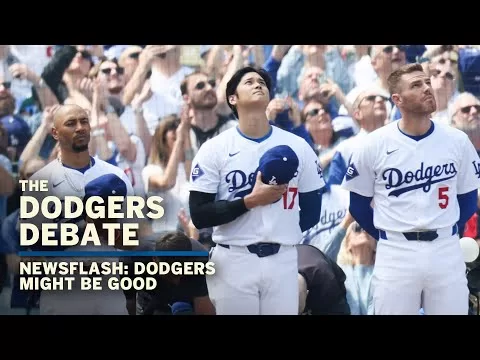Ireton, Ohtani’s acting interpreter, told Ebel that the two-way star wanted to discuss what had just happened on the bases — when Ohtani was tagged out trying to turn a double into a triple after failing to see Ebel hold up Mookie Betts at third in front of him.
It’s hardly unusual for players and coaches to debrief after such miscommunication on the field. Sometimes it will happen in the moment. Other times, in private conversations after the game.
But for Ebel, who like many with the Dodgers is still getting to learn Ohtani (or, in Ebel’s case, re-learn after being an Angels coach during Ohtani’s rookie MLB season in 2018), the fact the $700 million signing wanted to immediately clear up any confusion was music to the veteran coach’s ears.
“He was like, ‘I gotta learn from this,’” Ebel recounted Friday; explaining that, since there were no outs in the inning and Freddie Freeman was on deck, he held Betts up because he wasn’t 100% certain strong-armed St. Louis Cardinals outfielder Jordan Walker wouldn’t make a play at the plate.
Of Ohtani, Ebel added, “He’s always learning. He’s never a guy who is gonna turn away a time to learn. So I thought it was good on his part. And it was good for me, learning again how fast he is.”
Indeed, for all Ohtani accomplished in his home debut — in addition to his first-inning double, he walked in the third, singled in the fifth and thrilled a sellout crowd that had been waiting more than three months to see him play an official game at Chavez Ravine — his dugout interactions after the baserunning blunder might have been the most telling part of his day.
After Betts scored in the at-bat following Ohtani’s tag-out, Ohtani and Ireton approached him in the dugout for a similar chat, with Ohtani asking Betts how he had read the play.
“In Angel Stadium, that’s an easy triple, and I’m easily scoring,” Betts said. “But the dimensions of the field here are different. So I just told him that here, there aren’t as many triples, so you gotta keep your head up — but also, I gotta get faster and score on that ball.”
Between innings, Ohtani, Ebel and first base coach Clayton McCullough had their discussion regarding the play. Ohtani nodded as the coaches spoke, his English strong enough to understand much of what they said. Ireton also motioned along and interpreted the dialogue, ensuring they were all on the same page.

“He was like, ‘Here’s what I was thinking, here’s what I saw,’” McCullough said. “And then [we said] the flip side of things. How [the situation] was playing out. Where we were in the inning with the outs, and who was coming up. Just trying to get all of us on the same thought stream.”
If these all sound like rather mundane interactions, that’s because they mostly are.
Like any new player, Ohtani is still adjusting to his new surroundings — right down to being aware of where Ebel positions himself on the third base line as players round the bases.
Even after six weeks of spring camp, there are countless situations — just like Thursday’s mix-up on the bases — that can only be encountered once the intensity of the regular season kicks in.
What’s encouraging to Ohtani’s Dodger coaches and teammates: How routine the acclimation process has increasingly felt.
“Just because he’s really good,” Betts said, “doesn’t mean he’s not normal.”
Added hitting coach Robert Van Scoyoc, who has spent a lot of time interacting with Ohtani behind the scenes: “I wouldn’t say he’s any different at all. We talk to him every day, how’s he feeling, what his approach is gonna be, what he’s looking for. I mean, totally standard stuff.”
Shohei Ohtani rounds first on his first-inning double against the St. Louis Cardinals on Thursday.
(Robert Gauthier / Los Angeles Times)
Of course, several aspects of Ohtani’s transition to the Dodgers — even before news of the scandal surrounding him and his now ex-interpreter, Ippei Mizuhara, broke last week — have been inevitably unique.
Early in camp, the Dodgers afforded Ohtani an extreme amount of leeway in his buildup to the season.
Seemingly everybody with the team was surprised by Ohtani’s marriage announcement last month, unaware the 29-year-old superstar even had a girlfriend.
Most notably, the club has been forced to downplay the fallout of Ohtani’s accusations against Mizuhara, whom Ohtani accused of stealing millions of dollars from one of his bank accounts to pay off gambling debts.
The only discernible frustration from players related to that situation came after Thursday’s game, when a mob of dozens of Ohtani-seeking reporters clogged the clubhouse as other players were changing to leave.
This past week, there were also claims from some people around the Dodgers organization, including manager Dave Roberts, that Mizuhara acted like a “barrier” and “gatekeeper” between Ohtani and the rest of the team, making early communication with the offseason signing “difficult.”
But, especially with the since-fired Mizuhara removed from the equation, the team has raved about its dealings with the two-time MVP.
They have embraced him as an integral member of their new-look roster.
And, as Thursday afternoon’s dugout interactions displayed, they now know how to iron out even minuscule, mid-game mishaps in real-time, as well.
“Just watching his engagement with his teammates the last handful of days, it’s been fun for me to watch,” Roberts said before Thursday’s home opener. “Just on the bench, [he’s] engaging. There’s a little banter. He’s in there with the hitting coaches. He’s asking questions and things like that, which is great. I’m happy to see that. I think there’s only upside with that.”
Ohtani throwing program update
In addition to his big start at the plate (Ohtani entered play Friday with five hits and two RBIs in his first 13 Dodgers at-bats), Ohtani has also started a regimented throwing program.
After playing catch for the first time since last year’s Tommy John surgery on Monday, Ohtani was back on the field throwing a ball Friday afternoon. The session was observed by president of baseball operations Andrew Friedman, vice president of player performance Brandon McDaniel and a couple members of the training staff.
Roberts said the plan moving forward is for Ohtani to throw “every other day for the next couple weeks, and we’ll know how we go from there.”
